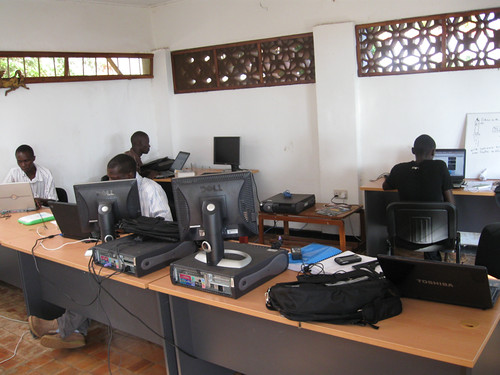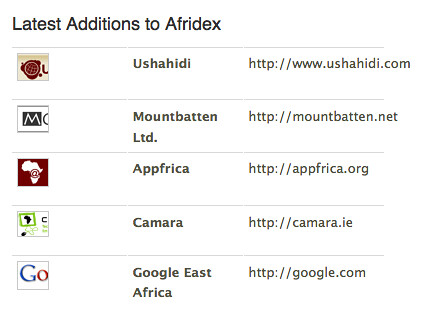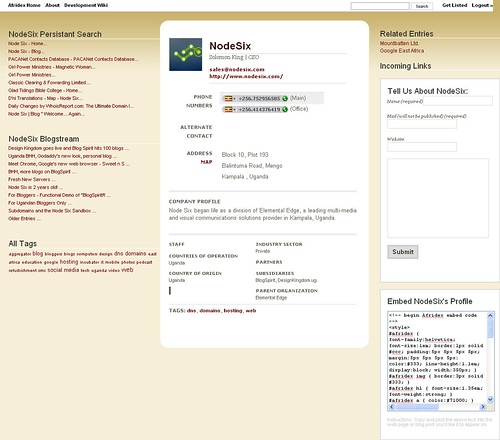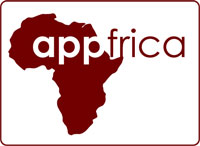 Earlier this year a new blog burst onto the African tech scene, and it hasn’t let up. In fact, it’s growing from a blog into a place for open source developers to work together. The man behind Appfrica is Jon Gosier, an energetic and proactive developer now living in Kampala, Uganda. Below is a short email interview that I did with him last week.
Earlier this year a new blog burst onto the African tech scene, and it hasn’t let up. In fact, it’s growing from a blog into a place for open source developers to work together. The man behind Appfrica is Jon Gosier, an energetic and proactive developer now living in Kampala, Uganda. Below is a short email interview that I did with him last week.
Q: What do you do?
Jon: I’m a glorified computer geek who works as a self-employed web developer and social media consultant in East Africa.
Q: What inspires you?
Jon: I’m a big fan of what’s going with the internet right now, specifically all the theory and development related to the semantic web (microformats, artificial intelligence, computational linguistics and dataparsing) where all that is heading. Simply put, technology inspires me.
Q: How did you get interested in Africa? Why Uganda?
Jon: I’m in Africa because of my girlfriend. She (also from the United States) works for an NGO called Water For People and they hired her as the African Regional Manager to supervise the launch of new offices in Rwanda, Malawi and Uganda over the next three years. At the time, I was spending a lot of time in San Francisco trying to find funding for various start-up ideas. It became clear to me that Silicon Valley VC space was becoming very insular, people were funding social networks built around other social networks and web apps for tasks like sorting email. My work was more social entrepreneurial and the response in the Valley was lukewarm at best. So I decided I’d go to Africa with her and execute my own ideas.
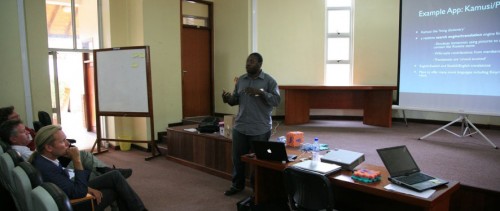
Q: Appfrica.net sprung onto the scene earlier this year. Where do you see that going, and how will you utilize it as a platform while in Africa?
Jon: App+frica is an initiative that facilitates African software developers and internet entrepreneurs. It’s entirely self-funded. Unfortunately, there aren’t many organizations outside of Africa that see the benefit of mentoring students and entrepreneurs in technology.
Appfrica also organizes events and workshops for local developers. Things like the Facebook Developer Workshop (18 October 2008) and Kampala Barcamp (19 August 2008), the upcoming µganda (Mobile Apps Uganda) and App+Asia. I also do hands on workshops where I’m teaching young developers programming and web development skills that will make them more competitive in the world market. You can read more at Appfrica.org.
The blog is Appfrica.net. Essentially it’s about innovation, development, social media and the internet as it all relates to Africa. There’s been some pretty healthy discussions around the content and Although I currently write everything, I’ve reached out to some local people who are considering joining the staff.
code.appfrica.net is a software repository that hosts and facilitates African developers. You might call it an Amazon S3-like service for Africa. Because there is no easy way to purchase things via the web in Africa (because many financial institutions don’t offer credit cards), something that many people don’t really have is access to is personal space on web servers outside of school. An even bigger problem is that there are very few local servers here and using anything hosted outside of the continent can be incredibly slow. It’s my goal to offer free, local server space to developers so that they can learn from each other, communicate freely and share. The site consists of a forum for African programmers, a subversion (SVN) server and a web version control system (TRACS). It also offers distributed file storage for developers like S3.
Beyond that, I try my best to help reshape misconceptions about Africa in the west by participating in technology conferences around the world. Even in the age of information people are surprisingly ignorant about Africa…especially when it comes to technology. When I mention Africa to people in the western business world, they overwhelmingly start asking questions about Darfur, Idi Amin and Robert Mugabi. It’s especially difficult to get technology conferences to let anyone in to even represent Africa or African technology companies.
The people of Africa account for over 14% of the worlds population and despite the AIDS epidemic, that number is growing (according to the C.I.A’s World Factbook). Why do people to often look the other way when it comes to technology and business here? Are businesses really afraid or do they just not understand the African market enough to care? The blog has largely become a way to get people in the West noticing all the wonderful things going on in the IT space here while also reporting the latest tech news for Africans.
Q: What is Question Box and what are your plans for that project?
Jon: QuestionBox.org is a project launched by Rose Shuman who lives in Los Angeles, CA in the United States. Her idea was to essentially allow people in rural areas around the world to use the internet via their mobile phones. It works like this: people in rural areas call or SMS the service with their question. A local operator consults a database (which also includes web searches) to discover the answer to those questions. The operator then responds in the local language.
My role as Chief Technical Officer is to build the software backend and to help direct growth and scalability. The service will allow for use via mobile device, the web or phone. For the SMS portion we’re integrating a micro-messaging application. When people SMS in their questions, we can index them and add them to a database that can be searched quickly offline. We can also publish the database online for the benefit of researchers or people using the web. Since internet connections aren’t as reliable as they are in the West, the service is built to work offline and only crawls the internet when it has a connection.
This allows people in rural, developing areas to get access to relevant information without the need for computers which are often not an option. What is an option, often already available, is mobile devices which have very high penetration numbers in the African market.
It’s our goal to democratize information in emerging markets using technology. So far the pilot programs have been huge regional successes. QuestionBox ran pilot programs in India last year and it encouraged her to expand to other areas of India as well as Africa starting with rural Uganda.
Q: You’ve been on the ground in Uganda for a couple weeks. First impressions?
Jon: One month exactly and we’ll be here for the next three years. We just got a house in the suburbs of the capital city Kampala. Getting reliable internet has been a huge chore, but that could be expected. I love it so far. Kampala is great, it’s very diverse and friendly. I’m looking forward to seeing more of Africa. I’ve got meetings next month in Rwanda and Tanzania and I’m working on going to Kenya and Egypt which are among the leaders of ICT development in the region.
 Just this week the CrowdFunding South Africa site was launched (look for them at SXSW this week in Austin), working off the theory that, “South Africa cannot compete in the global online sector if it isn’t funding start-ups at the beginning stage.” Their plan is to do this by getting:
Just this week the CrowdFunding South Africa site was launched (look for them at SXSW this week in Austin), working off the theory that, “South Africa cannot compete in the global online sector if it isn’t funding start-ups at the beginning stage.” Their plan is to do this by getting:
